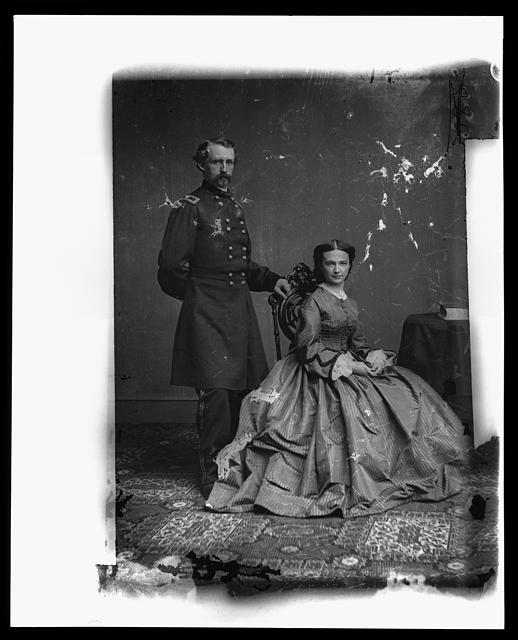Prelude to a Star

Part one in a series
The young officer walked out of the theatre and onto the bustling Washington street. Fixing his kepi atop his head, he began to make his way back to his boardinghouse. His affinity for plays was growing. The one he had attended on this cool April evening was a comedy. With the lines fresh in his head, he chuckled to himself as he walked along. Almost as comedic were the orders he received only a couple days earlier which, for the third time in ten days, changed the young man’s assignment. While some humor could be found in a War Department that did not seem to know what to do with a junior officer, there was enough seriousness in them to cause the young man to ponder his immediate future. Special Orders 174, dated April 16, 1863 would ultimately send George Armstrong Custer back to the Army of the Potomac. For Custer, this directive ended his five month sojourn from the army.
Custer had been serving as an aide-de-camp on the staff of George McClellan since the previous June. When “Little Mac” was relieved of command in November, 1862, Custer found himself without an assignment and went home on leave. Armstrong would spend the most of his leave in his adopted hometown of Monroe, Michigan. It was during this time that he would meet his future wife, Elizabeth Bacon. Indeed one may argue that had President Abraham Lincoln not relieved George McClellan from command, Custer may not have met his bride.
On April 8, 1863, Custer left Monroe and traveled back to Washington D.C. Upon his arrival at the War Department, he was immediately directed to take a train to New York. His presence had been requested by George McClellan. McClellan was in the process of writing his reports from the previous year’s campaigns and required assistance. Having served on McClellan’s staff from June-November 1862, Custer was the new ideal candidate. Custer would spend only two days with McClellan. The youth looked up to McClellan as a son to his father. Although their work was official, there is no doubt that the two enjoyed working together once again. On April 13, Custer was recalled to join his regiment, the 5th U.S. Cavalry. Three days later, Special Orders 174 was issued, directing Custer to take command of the regiment’s Company M. At the bottom of these orders is scribbled a note “Recd Tues Eve April 21/63”. More than likely, these supplemental orders missed Custer in New York as he was returning to Washington.
The same day that Custer was recalled from New York, Company M’s commander, Captain William McLean passed away at the Clarendon Hotel in Washington. Captain McLean’s death left the company without an officer, thus prompting Custer’s premature return. Upon receiving these new orders, Custer immediately requisitioned uniforms and blankets for his troopers. On April 30, he mustered the men in the camp near the Capitol. It seemed that Custer’s assignment was only temporary. With a new commander in route, Custer began his journey south to join the rest of the regiment with the Army of the Potomac. It had been a whirlwind month for the young lieutenant. Little did he know that the next two would be some of the most pivotal of his life.
Really looking forward to Part 2. I am a native Michiganian and have always been fascinated by Custer. The south had so many dashing Cavaliers (Stuart, Mosby, Forrest, Morgan come to mind) but we Yanks had Custer. I live in VA now and frequently go to CW sites, both famous and obscure. And I’ll be darned but just about all of them have some Custer signage! Last week on a day trip I happened to stop at Beaverdam train depot because there was a CW Trails sign. This spot is a speck off the beaten track. Lo and behold Custer had burned the original depot during the War. He sure got around. As a side note, I have seen some Flagger blogs contemptuously refer to the Virginia History Mobile as the Custermobile because there is a small picture of him on the montage which covers it. And I smile…
Custer’s Michigan Brigade along with elements from Tom Devin’s brigade wreck the station during the Yellow Tavern Raid in May 1864. They burned two trains and also free a number of Union prisoners who were headed for Southern prison camps. Many of these soldiers had been captured during the Laurel Hill fighting at Spotsylvania. One soldier remembered that Custer rode through the station, reigns in his teeth waving his saber in one hand and his hat in the other.